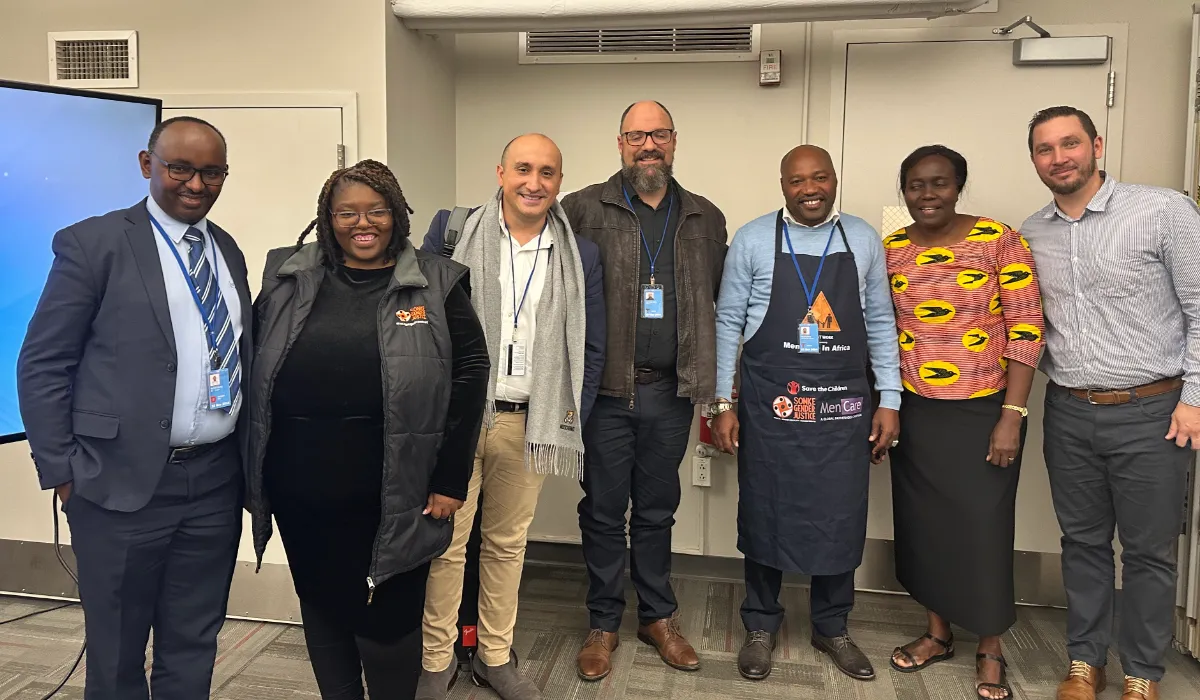Equimundo and Sonke Gender Justice, in conjunction with RWAMREC and the World Policy Centre, organised a side event at the 68th Session of the Commission on the Status of Women on the 11th of March 2024. This event highlighted the viability and implications of care focused policies for formally and informally employed working parents in low and middle-income countries. Influenced by the advocacy of organizations like Sonke Gender Justice and RWAMREC, South Africa and Rwanda have recently improved their parental leave policies.
On a worldwide scale, women are responsible for over three times the amount of child-rearing and maintaining a household than men. This uneven division of daily tasks leaves no room for women to achieve true and total equality, or for children and men to benefit mentally or emotionally. To create an equitable, peaceful society, men must also do their fair share of caretaking. Further, many workers in Africa are employed in the informal economy, with no access to any social or legal protection. The State of the World’s Fathers Report 2023 provides insights about parents, care, and care policies across varied economies in 16 countries, and global findings from the World Policy Center highlight nuances of providing parental leave to workers in informal employment.
Jean-Marie Nkurunziza, Sonke Gender Justice’s MenCare Regional Programme Specialist shared his personal story regarding access to leave and parenting in the informal economy. He explained how he and his family were positively impacted by these benefits while Sonke provides a full month (30days) payee leave for fathers. Jean-Marie’s story is a powerful reminder of the importance of family-friendly policies in the workplace.
Unpaid care work is frequently overlooked and undervalued as a social contribution. Many people, particularly women, are expected to take on the role of caregiving without any support or recognition. This often places an undue load on women and girls and leaves them with insufficient time and finances to pursue other options, such as school.
Furthermore, the absence of acknowledgment and support for unpaid care work exacerbates gender disparities. Women are frequently expected to perform most caregiving duties, which can limit their ability to fully participate in the workforce and result in lower salaries and career options. The session covered a range of topics related to parental leave policies and gender equality initiatives. Rumbidzai Chidoori, Sonke Gender Justice’s Regional Policy and Advocacy Coordinator provided insights into a legal case in South Africa where a couple contested the existing parental leave policy, which was discriminatory in that it provided 4 months maternity leave days for women and only 10 days for men. In this particular case the father, Mr Van Wyk was the parent who was in a position to take up most of the caretaking for their child, argued that the inequality in providing maternity leave without a corresponding period of paternity leave causes an unjustified limitation on the rights of a father and places an unjustifiable burden on the mother to become the default care-giver. Under the new interim conditions as ruled by the High Court, new parents from a natural birth will be able to determine how the four months of parental leave is shared among themselves, while parents of surrogate children, and adoptive parents to children under the age of two will get to enjoy the same parental leave rights. This court’s ruling reflects a recognition of the evolving nature of families, including gender non-conforming and same-sex partners, and the diverse forms of parenting. The speakers emphasized the need for policies that align with the changing dynamics of modern families.
The State of the Fathers report in Rwanda, Tanzania, and South Africa as well as Uganda, highlights the need for policies to support individuals in the informal economy. The burden of unpaid care work must be lifted off women and girls’ shoulders if we are to achieve gender equality. The State of London Patterns Report was also presented, which demonstrated increasing support for paternity leave, with differences in how men and women perceive care and the utilization of paternity leave. The speakers emphasized the need for state-subsidized, high-quality childcare support to complement parental leave.
The covered global trends in paid parental leave policies emphasise that 96% of countries have adopted nationwide paid leave policies, with longer leave being more common for mothers. However, the speakers also discussed the disparity in leave policies for men, with only about a quarter of countries ensuring access to at least 14 weeks of leave, in line with the International Labour Organisation recommendation. The speakers emphasized the need for comprehensive and inclusive policies that address affordability, wage replacement rates, job protection, and prohibitions of caregiver discrimination.

